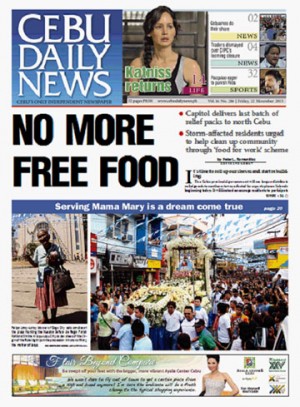
The Cebu provincial government will no longer distribute relief goods to northern towns affected by supertyphoon Yolanda beginning today. It will instead encourage residents to participate in the “food for work” scheme to clean up storm debris in their communities.
“We’re entering the rehabilitation phase now. That’s why we’ve stopped sending relief goods,” Vice Gov. Agnes Magpale told reporters yesterday.
The Capitol will start distributing today nails, galvanized iron roofing sheets and wood.
She said this move was based on feedback from municipal mayors who said they do not want the people to depend on the distribution of free food anymore.
She said San Remigio Mayor Mariano Martinez told her yesterday that residents were already starting to depend on the food relief packs given out by the government and private organizations.
A municipal employee involved in relief efforts in one northern Cebu town confirmed this trend.
“They just stand there waiting for relief goods to be handed out. When we called on the men to help our engineering team clear the roads, they just stare at us. Some walk away, murmuring that they’ll just wait for Good Samaritans to come,” said the employee, who requested anonymity.
The halt in the delivery of relief aid came a few days after Gov. Hilario Davide III admitted that some areas in northern Cebu have yet to receive food aid from the Capitol.
According to Evelyn Senajon, head of the Provincial Social Welfare and Development Office (PSWDO), they have distributed about 240,000 relief packs to residents of 13 towns and one city. She said the last wave of relief goods was sent yesterday to the beneficiary towns.
The Capitol started delivering food packs to affected towns a day after supertyphoon Yolanda made landfall in Daanbantayan on Nov. 8. Each food pack contains three kilos of rice, five tins of canned food, two packs of noodles and two 500ml bottles of water. A pack is estimated to feed a family of five for two days.
PSWDO’s Senajon said barangay leaders who will go to the Capitol to ask for food aid will be directed to their municipal authorities beginning today.
“We will discourage them from coming here because we will not give anymore. Instead, they should go directly to the mayor so that they’ll be given work and provided financial assistance,” she said.
Aside from the growing complacency of some residents, Magpale said there were enough relief goods distributed to the different towns, especially with the outpouring of aid from foreign as well as local donors.
“The municipalities are well stocked with relief goods now. The total of what we gave plus the aid from organizations and private individuals — it’s too much already,” she told reporters.
“Now, the mayors want to clean up and they want to do it through a ‘Food for Work’ program. As long as we start doling out more aid, it will not be successful.”
The vice governor said a number of towns already started a ‘Food for Work’ program to provide a temporary source of income for residents who lost their livelihood.
Participants who help clean up typhoon debris left by Yolanda will receive a daily wage.
“Somebody has to help cleaning up because the work cannot be done only by local government employees,” she said.
The ‘Food for Work’ program scheme was originally used by the Department of Social Welfare and Development (DSWD) to help calamity victims cope with their losses.
The Capitol’s move dovetails with the national government’s plan to shift to rehabilitation and recovery.
Nemia Antipala, assistant regional director of the DSWD, said the national government will start focusing on providing shelter to people affected by the calamity after two weeks of making sure they have food to eat.
“We are now planning how to respond to the shelter needs of the people,” she said.
She said social workers and debriefers who fanned out to areas affected by the storm reported that people now desire to rebuild their houses.
“They’re expressing their desire to recover,” Antipala said.
The provincial government already purchased construction materials for distribution to people who lost their homes.
Vice Governor Magpale said they will start distributing nails, galvanized iron roofing sheets and wood today.
She earlier called on the private sector to donate construction materials for the typhoon victims. Over 700,000 houses were destroyed or heavily damaged by the supertyphoon.
PSWDO’s Senajon said the provincial government is willing to pick up donations of construction materials and deliver them to towns chosen by donors.
She said municipal authorities were tasked to assess who among the affected residents will be given priority in the distribution of construction materials.
“Here in the level of the province, we are dependent on reports of the LGUs down the line and they will be the ones to assess,” she said.
“We will verify that so assistance will be given to the deserving recipients. We will be working closely with the local government unit,” she added.
The municipalities, she said, can also choose to use the P2 million financial assistance from the Cebu provincial government for the purchase of construction materials. /with a report from Correspondent Michelle Joy L. Padayhag